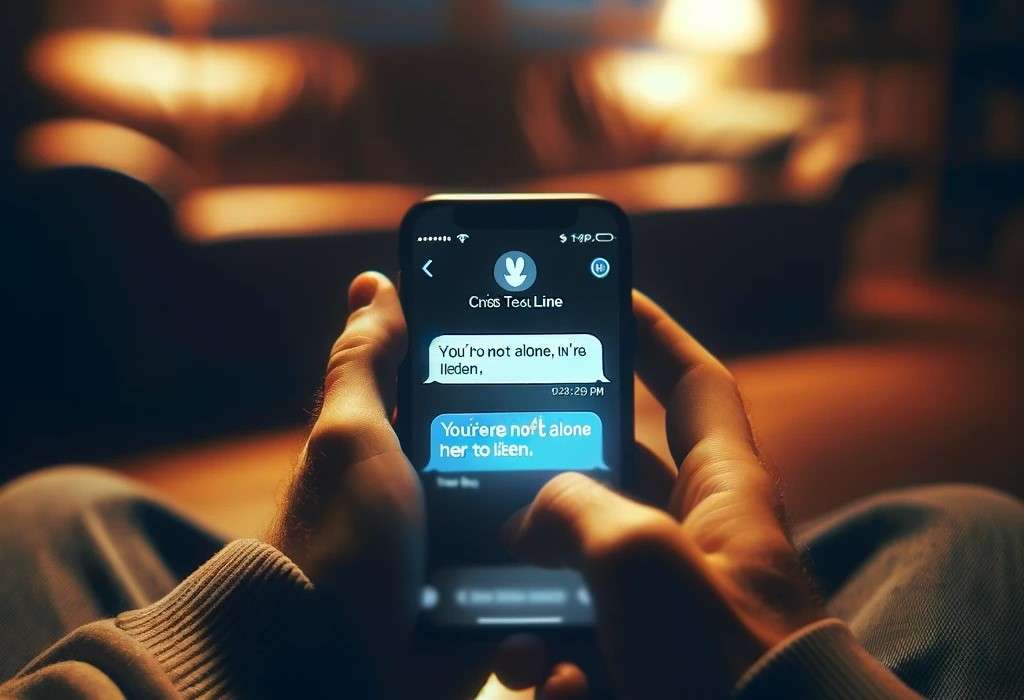FOR YOUR HEALTH: Supporting Other People’s Mental Health Changed My Own Life
 Helping others with mental health problems can be a way to help yourself, says author and mental health advocate J.D. Schramm.
Helping others with mental health problems can be a way to help yourself, says author and mental health advocate J.D. Schramm.
by J.D. Schramm
(NAPSI)—The first time I heard about Crisis Text Line was when one of my students shared information about this mental health support service in one of my classes on strategic storytelling. I was doubtful that a text messaging service, provided entirely by trained volunteers, could make a difference in people’s lives. Yet, I was intrigued and curious. The first time I contacted Crisis Text Line, by texting 741741 from my iPhone, was Thanksgiving of 2019. I had just lost one of my best friends to a brain tumor. My husband and I had decided it was too costly for me to return home for the funeral. This is when my grief started to set in. I was truly struggling. My own depression, which I’d faced since my teens, was “‘nudging at me” again. Then, add in holiday pressures, bickering over the trivial with my family, and trying to keep the kids engaged and off their devices — I was at the end of my rope that day. Without anybody else in the house knowing, I reached out and a complete stranger helped me to a place of calm. It was all I needed at that moment. I felt sheepish “taking up their time” when others had more pressing problems. The volunteer assured me that my needs mattered too.
A few times in the month that followed I reached out again and it was a lifeline for me during the holidays, which were, for me, a time of stress, loss, and confusion. It was the jolt I needed to be present to those I loved and attend to my own mental health with methods I knew worked for me.
Another year passed; the year we all remember being locked inside due to COVID. With so much attention placed on the mental health crisis that accompanied the pandemic, my thoughts returned to Crisis Text Line and the difference they made for me during my time of need. Could I provide that same help to others?
I applied and was accepted to train as a volunteer crisis counselor. As a professor of communication for over 20 years, I was surprised that I had so much to learn.
All my work had been around the power of public speaking and here those gifts were not required. I resisted the first lesson on listening skills, thinking, “What is there to hear in a text conversation?” I was so very wrong; in fact, there was a great deal to hear, but not with my ears. I was exposed to an entirely new experience of communication through text messaging, and the power it held particularly for young people who’d grown up with this medium.
The harder part was for me to learn to listen and not offer advice from my years of experience. Instead, I learned to ask thoughtful questions, to help the texter realize patterns, and move from heated to calm. In the spring of 2021, I completed my training and overcame my own feelings of inadequacy and fear. I became the stranger at the other end of the conversation and started to see how I too could be helpful to others.
Now, I’ve come full circle from that moment when I first dialed 741741. Most Friday nights, after my kids are in bed, I log on and take a four-to-six-hour shift of texting with strangers at their time of greatest need. Last month, I completed my 500th conversation on the platform. While I believe I’ve helped others, what I’m most clear about is how volunteering in this way has changed me. I listen better. I am slower to offer advice and look instead for ways to help others find their solution. I now know a ton about resources on a vast array of mental health topics, but I offer those only when it seems right. What people need most is empathy, my presence and connection, not my experience or wisdom.
Admittedly, I was doubtful when my student first shared about the power of text message exchanges between strangers to reduce depression, anxiety and loneliness. Now, I am convinced that text messages can, and do, make a difference one conversation at a time. It’s humbling to admit I was wrong but encouraging to see week after week how much text messages help. Ironically the same device that has the power to sometimes isolate us from others can also bring us together.
—Mr. Schramm is a mental health advocate, speaker, and writer. He serves on the faculty at USC’s Annenberg School of Communication and writes a regular newsletter, Communication Matters. His 2011 TED Talk, Break the Silence for Suicide Attempt Survivors, has been viewed over 2 million times. He and his husband, Rev. Ken Daigle, reside in Marin County with their three children.
Responsible journalism is hard work!
It is also expensive!
If you enjoy reading The Town Line and the good news we bring you each week, would you consider a donation to help us continue the work we’re doing?
The Town Line is a 501(c)(3) nonprofit private foundation, and all donations are tax deductible under the Internal Revenue Service code.
To help, please visit our online donation page or mail a check payable to The Town Line, PO Box 89, South China, ME 04358. Your contribution is appreciated!


Leave a Reply
Want to join the discussion?Feel free to contribute!